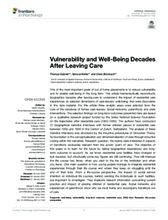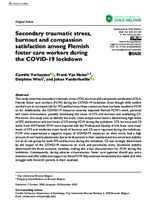

Displaying 31 - 40 of 237
This article compares the reception and integration of unaccompanied minors (UM) in the two countries with a particular focus on their access to education and employment.
This report presents the results of an independent investigation into abuses in intercountry adoption in the Netherlands during the period 1967-1998, and the role of the Dutch government in this regard.
This article hermeneutically reconstructs biographies decades after leaving-care to understand the impact of residential care experiences on selected dimensions of care-leavers’ well-being, that were discovered in the data material.
The aim of this study was to examine whether 1) attachment to the biological parents mediates the association between abuse and suicidal risk (SR) and 2) attachment to a foster parent (whether from a foster home or an institution) moderates the effect of attachment to biological parents on SR.
The aim of the current paper is to examine the demographic, crime-related and psychosocial characteristics of child welfare and juvenile justice youths in shared residential care and subsequently examine its relationship with offending behavior in adulthood.
The authors of this study examined caregivers’ mind-mindedness (their ability to adequately interpret their foster child’s internal mental states and behavior) in out-of-home care in the Netherlands, and the association among caregivers’ mind-mindedness (and its positive, neutral, and negative valence), recognition of the child’s trauma symptoms, and behavior problems.
The authors of this study examined attitudes about child maltreatment in China and the Netherlands.
This study investigates the extent and causes of child abandonment and various practices and services in relation to prevention of child abandonment in Denmark and other high-income countries.
This study examines secondary traumatic stress (STS), burnout and compassion satisfaction (CS) in Flemish foster care workers (FCW) during the COVID-19 lockdown.
This study shows that, when researching historical compulsory social measures, the inclusion of formerly institutionalised individuals in development and implementation is not only feasible, but is of significant benefit to the quality of the research.





